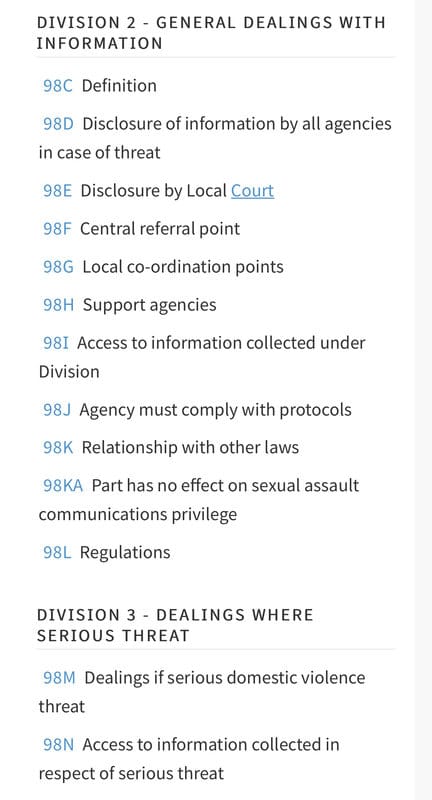Table of Contents
Privacy laws in Australia: Why are domestic violence victims not being protected by police?
A current news story revealed the alarming fact that victims of domestic violence are having their details made public. How on earth can this be occurring? Why aren’t privacy laws in Australia better protecting victims of heinous acts?!
The Queensland police department has been publicly criticised for jeopardising the safety of women in abusive relationships. A recent domestic violence victim was “forced into hiding after her details were accessed by a senior constable and leaked to her abusive former partner”. To say this is horrific is a gross understatement.
While the Queensland Civil and Administrative Tribunal (QCAT) ruled favourably in the recent case, the Queensland police has again rallied to have the decision overturned. However, The Queensland Government privacy disclosure checklist provides a comprehensive list of parameters that cannot be breached.
This is a clear case of adding insult to injury. Can you imagine that the very people who are positioned to protect and serve victims of violence are the very ones who are placing them in a position of further harm? It’s incredulous.
Instead of taking responsibility for this unimaginable and dangerous error, the Queensland police has added fuel to the fire. While this is a clear moral and ethical violation, it’s important to consider what breaches have arisen in a legal capacity.
What are the Australian privacy laws?
According to the Australian OAIC, privacy laws in Australia are governed by the The Privacy Act 1988 (Privacy Act). This Australian law “regulates the handling of personal information about individuals. Personal information is information or an opinion about an identified individual, or an individual who is reasonably identifiable.”
The Privacy Act provides a framework under which personal information is to be disclosed.
What privacy principles govern the law?
There are 13 Australian privacy principles (APP) that identify the standards, rights and obligations for the:
- handling
- holding
- use
- accessing
- and correction of personal information (including sensitive information)
What is the Privacy Act fact sheet according to OAIC?
There are strict rules that highlight what is permissible and what is not. In fact section 10 of the Privacy Act deals specifically with how sensitive information is to be treated.
APP 10.1 of the Privacy Act states that an organisation must not collect sensitive information about an individual unless:
- the individual has consented
- the collection is required by law
- the collection is necessary to prevent or lessen a serious and imminent threat to the life or health of any individual, where the individual whom the information concerns:
is physically or legally incapable of giving consent to the collection; or
physically cannot communicate consent to the collection
Clearly, point number 3, acts to prevent threat and harm to an individual. However, the disclosing of personal information, such as what occurred by the Queensland police constable is in direct violation of the intended clause.
What does the NSW police reflect in terms of privacy rights?
The NSW police public site states that “The NSW Police Force respects the privacy of our employees, volunteers and members of the public who use our services.”
As a government agency, it is required to comply with the requirements of the Privacy and Personal Information Protection Act 1998 and the Health Records and Information Privacy Act 2002. The website reflects their promise to uphold the laws by stating, “We are required to comply with these laws”.
To read another police related law article, simply click on the recently published “Disturbing yet legal police behaviour”.
Australian Privacy commissioner begins campaign to raise privacy laws’ awareness
The Office of Australian Information Commission (OAIC) seems very concerned about the issue surrounding Australian privacy laws. It’s a trending topic and the commissioner has even created a Privacy Awareness Week, urging both organisations and the community to become involved in the discussion.
Don’t be in the dark about privacy was created to illuminate issues pertaining to privacy in Australia.
Australian Information Commissioner and Privacy Commissioner Angelene Falk said “record support for the event shows privacy has come into sharp focus as a leading priority for organisations and the community.”
Falk spoke passionately saying that “our personal information is a vital input into the economy and government agencies”.
What is your individual right to privacy?
In Your right to privacy, the Australian government provides the following statement regarding an individual’s right to privacy.
“You have a right to have your personal information kept private”. The paper further states that “we adhere to strict laws”. How can the debacle that occurred be lawful, given the Australian government statements?
Are Australia’s privacy laws effective?
It appears that the answer to this question is a resounding NO!
The Australian Privacy Foundation boldly wrote that NSW state’s “privacy protection regime has been a complete basket case for decades.” Privacy Org reports that the “Commission has very limited powers, and has been very poorly resourced throughout its life, but particularly since 2004”.
How is Privacy considered in relation to the domestic and personal violence act?
Australia has a specific law that addresses domestic violence and the protocols that need to be upheld for compliance. The Crimes (domestic and personal violence) Act 2007 Division 2 of this Act relates to General dealings of Information.
The following shows some of the subsections of the Act.
Division 2 of the Privacy Act relates to Eligible Data breach.
Section 26WG actually has a clause entitled “Whether access or disclosure would be likely, or would not be likely, to result in serious harm”. The clause suggests that the law is transparent and yet, Queensland police violated the legislation.
In addition, Division 1 provides clear instructions regarding the interferences with privacy. The police department also negated this important clause.
However, it could be argued that privacy laws in Australia may actually need to be revised due to the following:
Section 16 Personal, family or household affairs
Nothing in the Australian Privacy Principles applies to:
(a) the collection, holding, use or disclosure of personal information by an individual
Division 2, section 16 of the Privacy Act states that nothing in the Act addresses use or disclosure by an individual and therefore the constable in the Qld police department may technically not be in breach. Is this a case of semantics or does the Privacy Act actually have some dangerous inclusions that need revision?
Why Australia needs to strengthen its privacy laws
In a recent article entitled “Australia should strengthen its privacy laws”, the shortfall of a lack of regulations was called into question. Australian data privacy laws were described as “generally weak” when compared to those in the United States, UK and the European Union.
Are you flabbergasted by the lack of clear language that exists in Australia’s privacy laws?
SCB Legal values your opinion and and we look forward to reading your comments.



